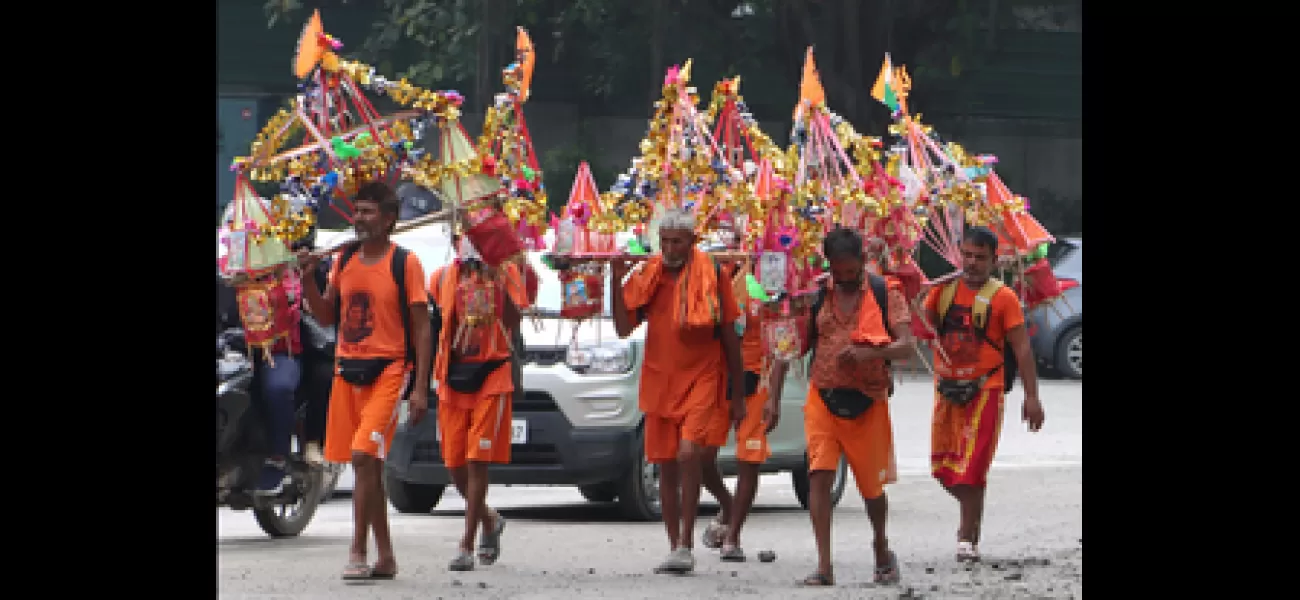Owners of both Hindu and Muslim-owned establishments are asking their staff to quit due to the cancellation of the annual Kanwar Yatra, leaving small dhabas worried about their income.
Muzaffarnagar man works at roadside dhaba during Shravan for 7 years to help Muslim owner with Kanwariya customers, earning Rs 400-600 and meals daily.
July 21st 2024.

In the bustling city of Muzaffarnagar, Brijesh Pal, a hardworking daily wage worker, has been lending his services at a local roadside dhaba for the past seven years during the holy month of Shravan. His Muslim employer, Mohammad Arsalan, has always appreciated his dedication and offered him a fair wage of Rs 400-600 along with two meals per day. However, this year, things took a turn for the worse when Arsalan asked Pal to seek employment elsewhere. The reason behind this unexpected change was the recent directive issued by the Uttar Pradesh government, which requires owners of hotels, restaurants, food carts, and eateries along the Kanwar Yatra route to display their names at their establishments.
This order, which was initially limited to Muzaffarnagar, has now been extended to the entire state of Uttar Pradesh, and even the neighboring state of Uttarakhand has a similar policy in place. The decision has sparked controversy and drawn criticism from opposition parties, civil society, and even some leaders from the ruling alliance. Pal, who used to rely on the dhaba job for income during the monsoon season when construction and farm work are scarce, expressed his disappointment with the situation. He shared, "Finding work during this time of year is quite difficult, and the dhaba job was a good source of income for me."
As the owner of the dhaba, Arsalan is also facing the repercussions of this policy. He fears that the Kanwariyas (Shiva devotees) who make the majority of his customers will avoid eating at his dhaba due to his Muslim name. He stated, "Even though our dhaba serves only vegetarian food and we make sure to avoid using garlic and onion during Shravan, I still had to display my name. But now, I am considering changing the name of my dhaba as I do not want to risk losing customers." This fear has also led to a decrease in business for Arsalan, making it difficult for him to afford extra staff this year.
But it's not just the Muslim owners and their staff who are affected by this order. Animesh Tyagi, a Hindu owner of a roadside eatery, shared that he had to let go of his Muslim staff member who worked on the tandoor due to the potential backlash from customers. He explained, "We do not want any trouble, and people can make an issue out of anything these days." Tyagi has now hired a Hindu worker to replace the previous staff member. Similarly, other dhaba owners have also expressed concerns about the lack of specific guidelines regarding the display of owners' names at their establishments.
The situation has become so dire that people have approached the local administration and even their elected representatives for help. Madan Bhaiya, an MLA from the ruling party's alliance, has received complaints from the affected eateries in his constituency. He shared, "This order seems to have been issued in a hurry, and it is negatively impacting the poor daily wage workers and small shopkeepers." Bhuwan Joshi, an office bearer of the Samajwadi Party, believes that this order is a deliberate attempt to divide society on the basis of religion. He shared, "This order will affect thousands of small businesses and is only serving to polarize the society."
Despite the mounting criticism, the state government has defended its decision, stating that it is necessary to maintain law and order and avoid confusion among the Kanwariyas. The district police have also clarified that the order is being followed voluntarily. However, the impact of this policy on the lives and livelihoods of individuals like Brijesh Pal and Mohammad Arsalan cannot be ignored. The local administration and elected representatives are trying to mitigate the effects of this order, but the underlying issue of discrimination based on religion and caste remains a cause for concern. As the debate over this controversial order continues, it is clear that it has already caused harm to the lives of many individuals and businesses.
This order, which was initially limited to Muzaffarnagar, has now been extended to the entire state of Uttar Pradesh, and even the neighboring state of Uttarakhand has a similar policy in place. The decision has sparked controversy and drawn criticism from opposition parties, civil society, and even some leaders from the ruling alliance. Pal, who used to rely on the dhaba job for income during the monsoon season when construction and farm work are scarce, expressed his disappointment with the situation. He shared, "Finding work during this time of year is quite difficult, and the dhaba job was a good source of income for me."
As the owner of the dhaba, Arsalan is also facing the repercussions of this policy. He fears that the Kanwariyas (Shiva devotees) who make the majority of his customers will avoid eating at his dhaba due to his Muslim name. He stated, "Even though our dhaba serves only vegetarian food and we make sure to avoid using garlic and onion during Shravan, I still had to display my name. But now, I am considering changing the name of my dhaba as I do not want to risk losing customers." This fear has also led to a decrease in business for Arsalan, making it difficult for him to afford extra staff this year.
But it's not just the Muslim owners and their staff who are affected by this order. Animesh Tyagi, a Hindu owner of a roadside eatery, shared that he had to let go of his Muslim staff member who worked on the tandoor due to the potential backlash from customers. He explained, "We do not want any trouble, and people can make an issue out of anything these days." Tyagi has now hired a Hindu worker to replace the previous staff member. Similarly, other dhaba owners have also expressed concerns about the lack of specific guidelines regarding the display of owners' names at their establishments.
The situation has become so dire that people have approached the local administration and even their elected representatives for help. Madan Bhaiya, an MLA from the ruling party's alliance, has received complaints from the affected eateries in his constituency. He shared, "This order seems to have been issued in a hurry, and it is negatively impacting the poor daily wage workers and small shopkeepers." Bhuwan Joshi, an office bearer of the Samajwadi Party, believes that this order is a deliberate attempt to divide society on the basis of religion. He shared, "This order will affect thousands of small businesses and is only serving to polarize the society."
Despite the mounting criticism, the state government has defended its decision, stating that it is necessary to maintain law and order and avoid confusion among the Kanwariyas. The district police have also clarified that the order is being followed voluntarily. However, the impact of this policy on the lives and livelihoods of individuals like Brijesh Pal and Mohammad Arsalan cannot be ignored. The local administration and elected representatives are trying to mitigate the effects of this order, but the underlying issue of discrimination based on religion and caste remains a cause for concern. As the debate over this controversial order continues, it is clear that it has already caused harm to the lives of many individuals and businesses.
[This article has been trending online recently and has been generated with AI. Your feed is customized.]
[Generative AI is experimental.]
0
0
Submit Comment





